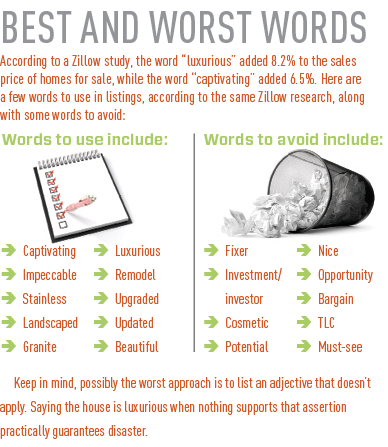Well-written listings can sell houses faster
By Michael Chazin
“I was wondering why the baseball was getting bigger. Then it hit me.” Words can capture the reader’s attention and evoke a range of emotions. And that applies to the words used in real estate listings. A “must-see” home that “has it all” and “is priced to sell” contains examples of overused and vague descriptions that should be avoided when constructing a listing.
A written real estate listing is the first salvo in a marketing campaign. A well-crafted listing provides a solid first strike in any effort to sell a residential property, while a hastily penned description misses the mark. “You only get one chance to make a first impression,” says Kathy Arents, CRS, The Group Inc., Fort Collins, Colorado. That’s why it matters which words get used in a listing.
The best words in a listing generate sales quickly, while less-well-crafted descriptions just sit there as properties languish. To sell any residential property, agents must understand the market. “Try to figure out who your buyer is, and then find that word picture to fit that buyer,” says Danny Thomas, CRS, M. Stagers Realty Partners, San Antonio.
“Sometimes we miss opportunities by not making good use of what I consider a narrative space,” adds Thomas. He advises new agents that a listing should try to set a scene. “Take the opportunity to explore features of the property by giving a benefit-oriented description.” Thomas sits back and walks through the property in his mind to create a word picture. “Every property has unique characteristics, so I try to craft these individually.”
Any number of words and phrases have become cliché and don’t really add important information to a listing. “Phrases such as ‘price reduced,’ ‘price improved’ or ‘motivated seller’ aren’t really useful,” says Arents. “The biggest issue is not sticking to the facts, such as saying it’s totally remodeled when it’s not.”
The best descriptions
From the get-go, Arents tries to invoke feelings; she gives buyers an idea of what it feels like to be in the house instead of offering descriptions of features. Maybe it has started to be overused, but she still likes the phrase “from the moment you walk in you’ll notice …” This can be followed by any number of statements, such as: the view, the craftsmanship or the natural light. “Let them know how they’ll feel in the house,” she says.
Often listings embellish too much, which can give prospective buyers a distorted view of the property, suggests Lilli Schipper, CRS, Douglas Elliman Real Estate, Fort Lauderdale, Florida. The problem is when a listing makes a statement such as “lush landscaping” or “amazing view,” and neither one is evident. “You want to create excitement, but it has to be realistic, so it’s a fine line,” she says.
Sellers need to remember that often buyers are attracted to specific features and experiences. “You want to give them information that hits on, ‘Oh! That’s what I am looking for,’” says Schipper. One current buyer, for example, wants a house with a pool or room for a pool. “Sometimes you can’t tell from the photos, so for us in Florida, you need to say ‘large backyard; room for a pool.’”
Once a listing is written, it’s always good to have someone else review it. “Get a second opinion,” says Schipper. “What you thought was a really good feature might confuse someone else.” She also goes back to property owners to get their approval when the property first lists and asks if anything might be missing or could be said better.
Specific benefits pay off

Anyone who pays attention will notice that listings continually use the same words, suggests Karen Hall, CRS, At Home Real Estate, Alexandria, Virginia. “I try to paint a picture of the experience that you can only get by living there,” she says. When a listing points out a specific benefit, often a higher price can follow. “Everyone says ‘walk to Metro,’ but the moment you offer a $100 Metro card, people flock to those houses,” says Hall. Buyers figure it must indeed be walking distance or a monetary offer wouldn’t be made.
To begin listing development, Hall always ask sellers the same questions. What do they love most about living there and what features led them to buy originally. “Time and again they will give you these amazing descriptions and their words often go into the marketing we use,” she says. One woman was adamant there was nothing special about her house, but on a tour she described how when the sun hit the brick accent wall, it looked like a painting. “So I used those words to paint a picture that came from the person who loved that home the most.”
Hall has seen how words make a difference many times. She reworked the listing for a house that wouldn’t sell, kept the same price and suddenly it became popular. “All I changed were the remarks and that created a revised image, and a buyer submitted a full-priced offer,” she says. So many agents focus on picture quality and forget the importance of words. “I tell everyone, words have meaning. You have to choose them carefully.”
For more popular home description words, go to point2homes.com/news and locate the Real Estate Keywords article (Feb. 17, 2020).








